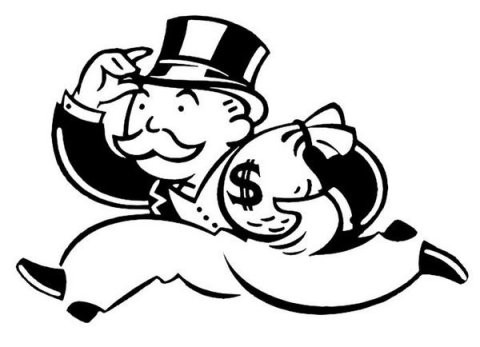
The Canadian government loses over 40 billion dollars every year because of tax loopholes.
Most of that money ends up in the pockets of large corporations and very rich people, whose wealth would continue to grow even if those loopholes were closed.
Meanwhile, the public services we all benefit from such as healthcare, education, public transport, and protecting the environment, remain underfunded.
Canada's worst tax loopholes:
Capital gains exclusion
Capital gains are categorized as income, but Canadian tax policy mandates that only 50% of your capital gains be included in your taxable income. Individuals and corporations who have income through capital gains get half of it tax free, while everyone else pays the full rate of tax on the income they earn from actually working. Over 90% of the value of this tax break goes to the top 10%, and an estimated 85% of the value goes to the top 1% of income recipients. [Learn more...]
Tax havens
International tax dodging costs Canada between $10 billion and $25 billion every year. The use of tax havens is almost exclusively for the benefit of the largest corporations and wealthiest people. Canada even has "double-non-taxation agreements" with over 80 countries, which often prevent companies from being taxed in either Canada or the other country. [Learn more...]
The corporate dividend tax credit
Individual shareholders who receive corporate dividends get a tax break. It was established to compensate shareholders for the corporate taxes that businesses pay, but is unfair in practice because beneficiaries save more money as tax credits than they supposedly lost through taxes on their shares, Canada's corporate tax rates are already at all-time lows, and almost all the people saving money via this tax credit are already very wealthy. [Learn more...]
Tax breaks for oil & gas companies
Canadian governments subsidize the fossil fuel industry to the tune of $4.8 billion per year, through things like lower carbon tax rates, reductions on crown royalties, tax credits for infrastructure, and support for research & development. [Learn more...]
Stock option deductions
Stock options get treated like capital gains (see above), so money made from stock options gets taxed at half the rate everyone else pays on their employment income. Most of the people benefitting from this loophole are already rich executives who receive stock options as a form of compensation. In fact, over 90% of the value of this $840 million tax loophole goes to the top 1%: those making over $250,000 a year. [Learn more...]
Business meals and entertainment expense deductions
Businesses can deduct half the cost of a wide variety of expenses, such as all manner of restaurant meals and drinks, private boxes and tickets to sports events and concerts, full vacations, and much more. Some forms of meal and entertainment expenses such as office parties can be fully deductible. The original intent was to give small businesses a tax break for the cost of conducting business with clients. However, the deduction has become widely abused by big corporations. [Lean more...]
Deductions for executive pay
Canada’s 100 highest-paid CEOs received an average of $10.9 million annually in 2020 - 191 times more than the average worker wage. The money paid to executives can be claimed as a “cost of doing business” no matter how obscene the salary. [Learn more...]
| Loophole | Annual Cost |
|---|---|
| Capital gains exclusion | $22 billion |
| Tax havens | $10 billion + |
| Corporate dividend tax credit | $5 billion |
| Tax breaks for oil & gas companies | $4.8 billion |
| Stock option deduction | $500 million |
| Business meals and entertainment expenses | $200 million + |
| Business deduction for executive pay | ? |
| TOTAL: | $42.5 billion + |
The people vs. special interests
Closing these loopholes is possible and in many cases simple, but politicians have been reluctant to act, due in part to lobbying by special interests. Only public pressure can move them to adopt the needed changes in our tax laws, and recover the billions we need to support our public services.
OTHER BAD LOOPHOLES:
- The British Virgin Islands switch tax avoidance scheme, detailed in Canadian Accountant and the Star
- The Smith Maneuver, described in Better Dwelling
- The tax deductibility of foreigh internet advertising, noted by the Canadian Senate
- The corporate deduction of interest, Canada has introduced a new legislation (EIFE) to reduce this problem detailed by Osler
- The captive insurance loophole, a problem in both Canada and the US.
- The loophole for royalty payments on intellectual property
- The non-applicability of GST to financial institutions
- The Scientific Research and Experimental Development Tax Credit, detailed by The Logic
- Fossil fuel and mining tax subsidies, explained by the International Institute for Sustainable Development
- Tax-dodging through trusts, explained in the Toronto Star by Marco Chown Oved
- Tax-avoidance through Canadian-Controlled Private Corporations
- Surplus Stripping, an issue addressed by Allan Lanthier
OTHER RESOURCES:
- Finance Canada’s Report on Federal Tax Expenditures, which gets updated with federal budgets.
- Out of the Shadows: Shining a light on Canada’s unequal distribution of federal tax expenditures, by David Macdonald, Canadian Centre for Policy Alternatives, December 2016
- Are Tax Loopholes Sexist? The gender distribution of federal tax expenditures, by David Macdonald, Canadian Centre for Policy Alternatives, March 2019
